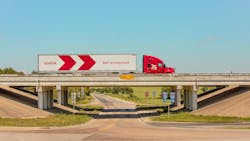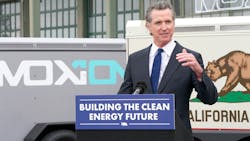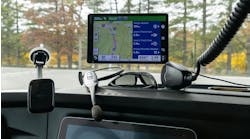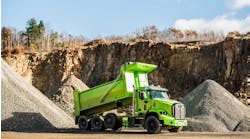California Governor Gavin Newsom vetoed a state bill that would have banned humanless truck testing and operations in the state where a number of the autonomous driving developers are based.
Newsom said that Assembly Bill 316, which had strong Teamster union support, is unnecessary to regulate the AV industry because existing California regulations already oversee heavy-duty autonomous vehicle development. Since 2012, the state Department of Motor Vehicles has had the authority over AV deployment and testing through consultation with the California Highway Patrol, National Highway Traffic Safety Administration, and others.
“Autonomous vehicle technology is evolving and DMV remains committed to keeping our rules up to date to reflect its continued development in California,” Newsom wrote in a Sept. 22 veto message to the state Assembly.
See also: Road to humanless trucking hits a California-sized political pothole
He noted that the DMV has held public workshops on light-duty and heavy-duty AV development, and its rulemaking will be part of a “public process where subject matter experts and other stakeholders will have the opportunity to shape the regulations related to the safe operations of autonomous vehicles in California.”
Autonomous proponents continue to make safety argument
The Autonomous Vehicle Industry Association, the most vocal trade organization against the legislation, applauded the governor’s veto.
“As a result, California’s safety experts can continue to evaluate autonomous vehicle technology and consider appropriate regulatory action,” Jeff Farrah, AVIA executive director, said Sept. 22. “We look forward to continuing to work with the California DMV, California Highway Patrol, Labor and Workforce Development Agency, and other state regulators that are evaluating the future of autonomous trucking technology in the state.”
The AVIA and AV development companies that make up the organization have long pointed to the thousands of traffic deaths across the nation as a reason to champion self-driving technology. In 2022, NHTSA estimated that 4,400 of the 43,000 nationwide highway deaths happened in California.
Other studies show that robotic Class 8 trucks are about 10% more efficient than human-driven trucks and can operate closer to 24 hours per day because they wouldn’t be subjected to hours-of-service regulations that mandate human driver rest time.
See also: How Loadsmith plans to use autonomous trucks to boost driver jobs and cut emissions
California’s political atmosphere toward AV development has also pushed Silicon Valley-based self-driving companies, such as Kodiak Robotics and Waymo, to move most of their testing operations to Texas.
“We are thankful to Governor Newsom for his decision to veto AB 316 and allow California’s safety experts, not its politicians, to regulate the autonomous trucks,” Daniel Goff, head of policy at Kodiak, told FleetOwner over the weekend. “We believe deeply in the potential for autonomous trucking technology and look forward to working with regulators at the California Department of Motor Vehicles and Highway Patrol to ensure our technology saves lives, grows the economy, and supports drivers.”
Self-driving trucking companies, such as Kodiak, Torc Robotics, and Aurora, are focused on hub-to-hub Autonomous Freight Network models, where a self-driving tractor-trailer would move freight along divided highways. At the hubs, freight is transferred to or from regional human drivers.
Kodiak, for example, has truckports in the Dallas-Ft. Worth area and a Pilot travel center outside Atlanta, first- and last-mile operations drop off and pick up freight moving across the South in self-driving Kodiak trucks. It tests this autonomous freight movement with safety drivers behind the wheel in both areas.
Goff said that Kodiak’s primary operational focus remains in Texas, Oklahoma, and Atlanta. But the AV company looks forward to begin test its technology in California as part of its path to offering coast-to-coast service in the coming years.
Teamsters promise to keep up fight against AVs
Teamsters General President Sean M. O’Brien, in a statement before Newsom’s veto, said the Governor is sending a message nationwide that technology should overrule middle-class jobs. “Gov. Newsom, I got a message for you: ‘You want to veto this bill and take on 1.2 million Teamsters in the country? Put your helmet on and buckle in your chinstrap.”
The Teamsters content autonomous trucking would cost thousands of drivers their jobs. AV proponents contend that AV operations would create more local driving jobs and that nationwide, widespread humanless transport is decades away. Most AV companies expect the first truly humanless operations to begin mid-decade on Sunbelt lanes.
See also: AB 316 would push cleaner, safer highways into next decade
A U.S. Department of Transportation-funded study found autonomous trucks could create $111 billion in aggregate investment spending across the U.S. and add more than 26,000 jobs annually.
In his veto message, Newsom said his administration is committed to incentivizing job creation and training in autonomous vehicle technology.
“Considering the longstanding commitment of my administration to addressing the present and future challenges for work and workers in California, and the existing regulatory framework that presently and sufficiently governs this particular technology, this bill is not needed at this time,” the governor wrote. “For these reasons, I cannot sign this bill.”
AV opponents, such as the Teamsters and other labor organizations, have pointed to robo-taxi problems on city surface roads in San Francisco. AVIA notes there are no recorded fatalities involving an AV truck, but human-operated commercial trucks were involved in nearly 6,000 highway deaths nationwide in 2021.
“Precisely one person has been injured in a crash involving an autonomous truck—and that crash was caused by a human driver who cut off the autonomous truck,” AVIA’s Farrah noted earlier this year.
While the California legislature can override a veto with a two-thirds majority vote, it hasn’t done this since 1979.







